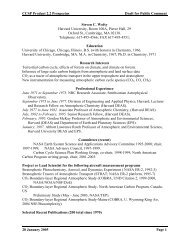Decision support experiments and evaluations using seasonal to ...
Decision support experiments and evaluations using seasonal to ...
Decision support experiments and evaluations using seasonal to ...
You also want an ePaper? Increase the reach of your titles
YUMPU automatically turns print PDFs into web optimized ePapers that Google loves.
The U.S. Climate Change Science Program Chapter 3<br />
Limited stakeholder<br />
participation <strong>and</strong><br />
political influence<br />
in decision-making<br />
processes means<br />
that decision-<strong>support</strong><br />
products may not<br />
equitably penetrate <strong>to</strong><br />
all relevant audiences.<br />
86<br />
means that information generated by decision<strong>support</strong><br />
networks must be communicated <strong>to</strong><br />
various audiences in ways relevant <strong>to</strong> their roles<br />
<strong>and</strong> responsibilities (Section 3.2.1). Figure 3.2<br />
<strong>and</strong> discussion of the fac<strong>to</strong>rs that led <strong>to</strong> development<br />
of better decision <strong>support</strong> for flood hazard<br />
alleviation on the Red River of the North reveal<br />
how extreme environmental conditions compound<br />
the challenge in conveying information<br />
<strong>to</strong> different audiences given the dislocation <strong>and</strong><br />
conflict that may arise.<br />
Third, limited stakeholder participation <strong>and</strong> political<br />
influence in decision-making processes<br />
means that decision-<strong>support</strong> products may not<br />
equitably penetrate <strong>to</strong> all relevant audiences.<br />
It also means that because water issues typically<br />
have low visibility for most of the public,<br />
the economic <strong>and</strong> environmental dislocations<br />
caused by climate variability events (e.g.,<br />
drought, floods), or even climate change, may<br />
exacerbate these inequities <strong>and</strong> draw sudden,<br />
sharp attention <strong>to</strong> the problems resulting from<br />
failure <strong>to</strong> properly integrate decision-<strong>support</strong><br />
models <strong>and</strong> forecast <strong>to</strong>ols, since disasters often<br />
strike disadvantaged populations dispropor-<br />
Figure 3.2 Water resources decision processes.<br />
tionately (e.g., Hurricane Katrina in 2005)<br />
(Hartmann et al., 2002; Carbone <strong>and</strong> Dow,<br />
2005; Subcommittee on Disaster Reduction,<br />
2005; Leatherman <strong>and</strong> White, 2005).<br />
Fourth, the lack of adequate cross-disciplinary<br />
interaction between science, engineering, public<br />
policy-making, <strong>and</strong> other knowledge <strong>and</strong><br />
expertise sec<strong>to</strong>rs, as well as across agencies,<br />
academic institutions, <strong>and</strong> private sec<strong>to</strong>r organizations,<br />
exacerbates these problems by making<br />
it difficult for decision-<strong>support</strong> information<br />
providers <strong>to</strong> communicate with one another.<br />
It also exacerbates the problem of information<br />
overload by inhibiting use of incremental<br />
additional <strong>to</strong>ols, the sources <strong>and</strong> benefits of<br />
which are unclear <strong>to</strong> the user. In short, certain<br />
current decision-<strong>support</strong> services are often narrowly<br />
focused, developed by over-specialized<br />
professionals working in a “s<strong>to</strong>vepipe” system<br />
of communication within their organizations.<br />
While lack of integration can undermine the<br />
effectiveness of decision-<strong>support</strong> <strong>to</strong>ols <strong>and</strong><br />
impede optimal decisions, it may create opportunities<br />
for design, development <strong>and</strong> use of<br />
effective decision-<strong>support</strong> services.




